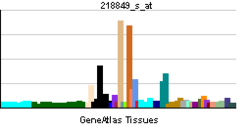PPP1R13L
RelA-associated inhibitor is a protein that in humans is encoded by the PPP1R13L gene.[1][2]
Interactions
PPP1R13L has been shown to interact with Sp1 transcription factor[3] and RELA.[1][3]
References
- ↑ 1.0 1.1 Yang JP, Hori M, Sanda T, Okamoto T (Jun 1999). "Identification of a novel inhibitor of nuclear factor-kappaB, RelA-associated inhibitor". J Biol Chem 274 (22): 15662–70. doi:10.1074/jbc.274.22.15662. PMID 10336463.
- ↑ "Entrez Gene: PPP1R13L protein phosphatase 1, regulatory (inhibitor) subunit 13 like".
- ↑ 3.0 3.1 Takada, Norio; Sanda Takaomi; Okamoto Hiroshi; Yang Jian-Ping; Asamitsu Kaori; Sarol Lilen; Kimura Genjiro; Uranishi Hiroaki; Tetsuka Toshifumi; Okamoto Takashi (Aug 2002). "RelA-Associated Inhibitor Blocks Transcription of Human Immunodeficiency Virus Type 1 by Inhibiting NF-κB and Sp1 Actions". J. Virol. (United States) 76 (16): 8019–30. doi:10.1128/JVI.76.16.8019-8030.2002. ISSN 0022-538X. PMC 155123. PMID 12134007.
Further reading
- Liu ZJ, Lu X, Zhong S (2005). "ASPP--Apoptotic specific regulator of p53". Biochim. Biophys. Acta 1756 (1): 77–80. doi:10.1016/j.bbcan.2005.08.002. PMID 16139958.
- Takada N, Sanda T, Okamoto H et al. (2002). "RelA-Associated Inhibitor Blocks Transcription of Human Immunodeficiency Virus Type 1 by Inhibiting NF-κB and Sp1 Actions". J. Virol. 76 (16): 8019–30. doi:10.1128/JVI.76.16.8019-8030.2002. PMC 155123. PMID 12134007.
- Strausberg RL, Feingold EA, Grouse LH et al. (2003). "Generation and initial analysis of more than 15,000 full-length human and mouse cDNA sequences". Proc. Natl. Acad. Sci. U.S.A. 99 (26): 16899–903. doi:10.1073/pnas.242603899. PMC 139241. PMID 12477932.
- Bergamaschi D, Samuels Y, O'Neil NJ et al. (2003). "iASPP oncoprotein is a key inhibitor of p53 conserved from worm to human". Nat. Genet. 33 (2): 162–7. doi:10.1038/ng1070. PMID 12524540.
- Colland F, Jacq X, Trouplin V et al. (2004). "Functional Proteomics Mapping of a Human Signaling Pathway". Genome Res. 14 (7): 1324–32. doi:10.1101/gr.2334104. PMC 442148. PMID 15231748.
- Gerhard DS, Wagner L, Feingold EA et al. (2004). "The Status, Quality, and Expansion of the NIH Full-Length cDNA Project: The Mammalian Gene Collection (MGC)". Genome Res. 14 (10B): 2121–7. doi:10.1101/gr.2596504. PMC 528928. PMID 15489334.
- Slee EA, Gillotin S, Bergamaschi D et al. (2005). "The N-terminus of a novel isoform of human iASPP is required for its cytoplasmic localization". Oncogene 23 (56): 9007–16. doi:10.1038/sj.onc.1208088. PMID 15489900.
- Issaeva N, Bozko P, Enge M et al. (2005). "Small molecule RITA binds to p53, blocks p53-HDM-2 interaction and activates p53 function in tumors". Nat. Med. 10 (12): 1321–8. doi:10.1038/nm1146. PMID 15558054.
- Zhang X, Wang M, Zhou C et al. (2005). "The expression of iASPP in acute leukemias". Leuk. Res. 29 (2): 179–83. doi:10.1016/j.leukres.2004.07.001. PMID 15607367.
- Laska MJ, Nexø BA, Vistisen K et al. (2005). "Polymorphisms in RAI and in genes of nucleotide and base excision repair are not associated with risk of testicular cancer". Cancer Lett. 225 (2): 245–51. doi:10.1016/j.canlet.2005.03.021. PMID 15885892.
- Skjelbred CF, Saebø M, Nexø BA et al. (2006). "Effects of polymorphisms in ERCC1, ASE-1 and RAI on the risk of colorectal carcinomas and adenomas: a case control study". BMC Cancer 6: 175. doi:10.1186/1471-2407-6-175. PMC 1533843. PMID 16817948.
- Beausoleil SA, Villén J, Gerber SA et al. (2006). "A probability-based approach for high-throughput protein phosphorylation analysis and site localization". Nat. Biotechnol. 24 (10): 1285–92. doi:10.1038/nbt1240. PMID 16964243.
- Bergamaschi D, Samuels Y, Sullivan A et al. (2006). "iASPP preferentially binds p53 proline-rich region and modulates apoptotic function of codon 72-polymorphic p53". Nat. Genet. 38 (10): 1133–41. doi:10.1038/ng1879. PMID 16964264.
- Olsen JV, Blagoev B, Gnad F et al. (2006). "Global, in vivo, and site-specific phosphorylation dynamics in signaling networks". Cell 127 (3): 635–48. doi:10.1016/j.cell.2006.09.026. PMID 17081983.
- Zhang X, Diao S, Rao Q et al. (2007). "Identification of a novel isoform of iASPP and its interaction with p53". J. Mol. Biol. 368 (4): 1162–71. doi:10.1016/j.jmb.2007.03.001. PMID 17391696.
- Laska MJ, Strandbygård D, Kjeldgaard A et al. (2007). "Expression of the RAI gene is conducive to apoptosis: studies of induction and interference". Exp. Cell Res. 313 (12): 2611–21. doi:10.1016/j.yexcr.2007.05.006. PMID 17570360.
